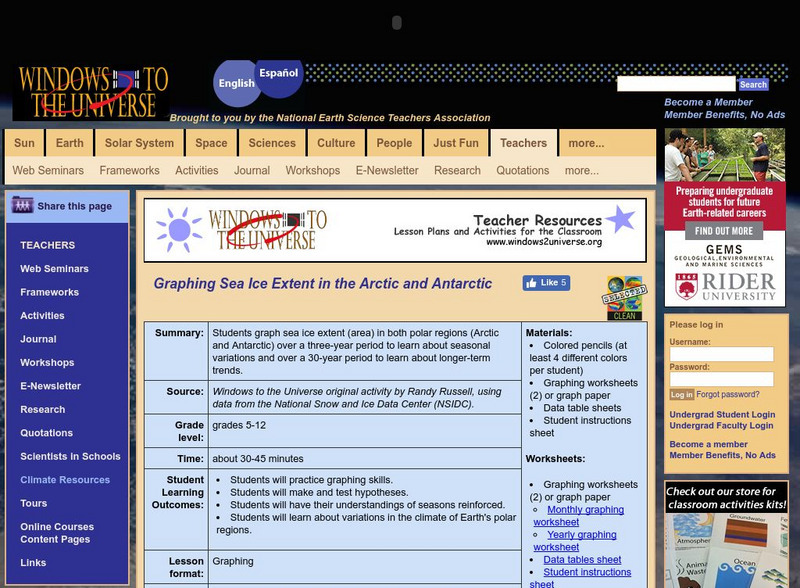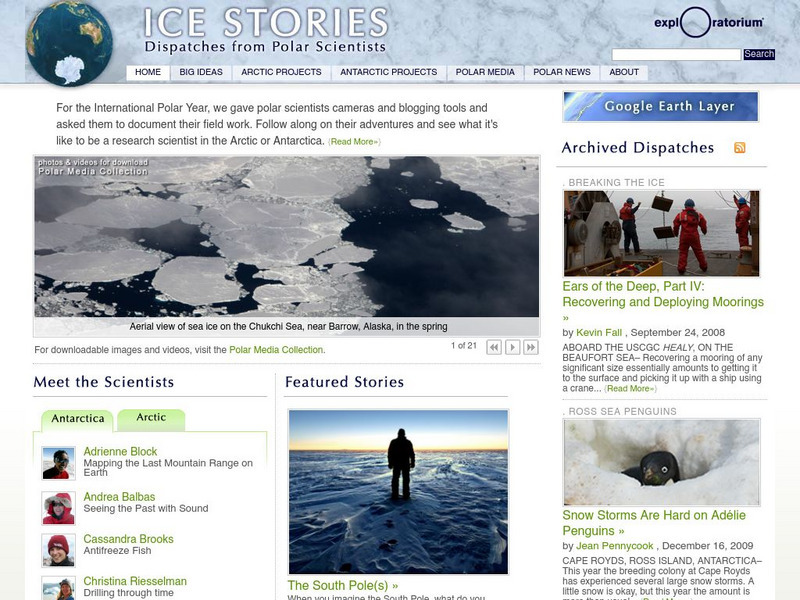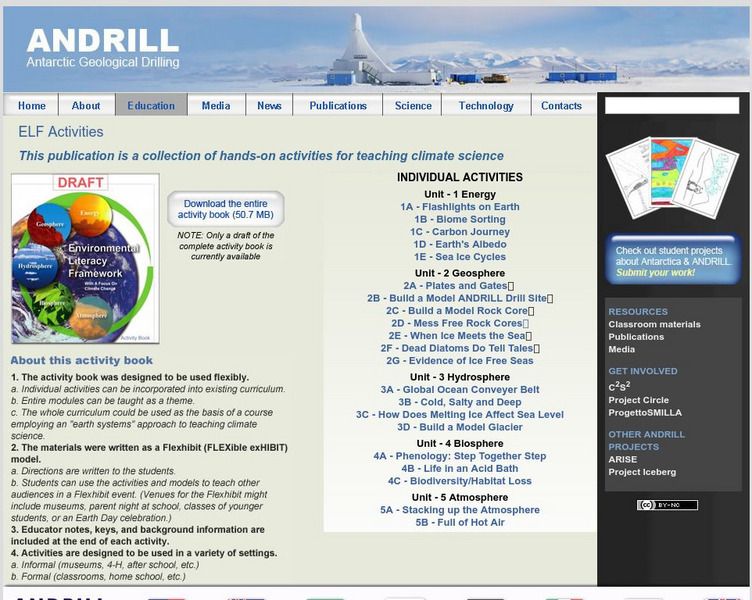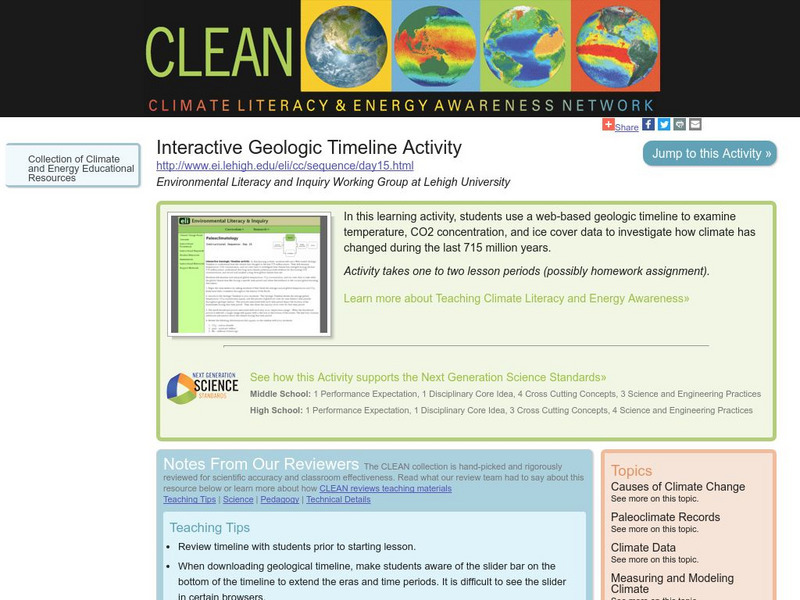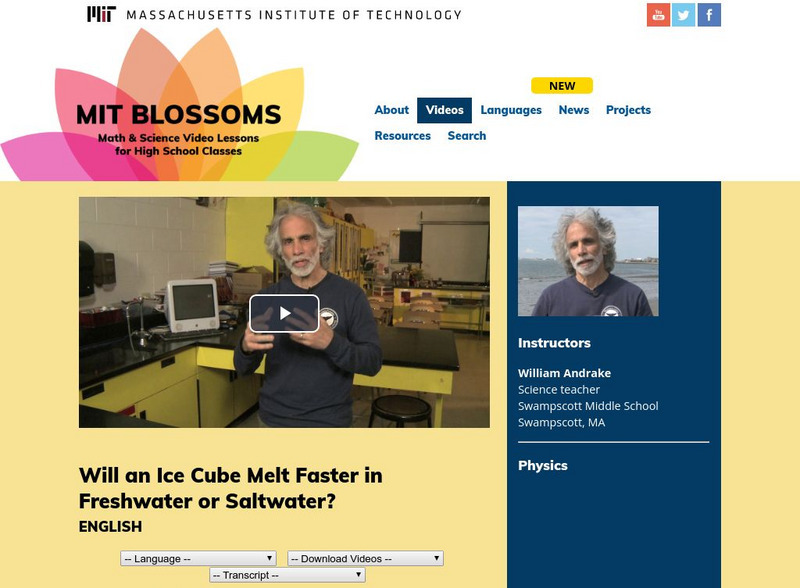National Earth Science Teachers Association
Windows to the Universe: Graphing the Extent of Sea Ice in Arctic and Antarctic
Students graph sea ice extent in both polar regions over a three-year period to learn about seasonal variations, and over a 30-year period to learn about longer-term trends.
University Corporation for Atmospheric Research
Ucar: Sea Ice and Heat: A Vicious Cycle
Melting sea ice doesn't cause sea level to rise because the ice is already in the ocean, but it does cause other changes to the planet. When sea ice melts, more sunlight is absorbed by the Earth, which causes more warming. It's a vicious...
Exploratorium
Exploratorium: Ice Stories: Dispatches From Polar Scientists
During the International Polar Year, scientists descended on the Arctic and the Antarctic in droves. While there, they documented their experiences and research work. That rich database of information, covering November 2007 to October...
NASA
Nasa Earth Observatory: Polar Paradox
In this article about global warming, learn how the warming climate could affect the polar ice caps, glaciers, sea ice, and amount of freshwater entering the polar oceans. Read how some scientists believe global warming could add to...
Other
Cape Farewell Arctic Voyage
Cape Farewell is an organization dedicated to the study of the ocean's role in regulating global temperature and its relationship to climate change and global warming. Each year a trek is made in order to study these climate changes....
Other
Antarctic Geological Drilling: Environmental Literacy Framework Activities
An impressive collection of lessons on climate science and climate change. The entire book can be downloaded. As well, each lesson has its own page with some combination of background information, PowerPoints, images, maps, glossaries,...
Society for Science and the Public
Science News for Students: Antarctica Warms, Which Threatens Penguins
Describes the threat of climate change in the Antarctica to emperor penguins by affecting the ice sheets where penguin breeding grounds are located.
Climate Literacy
Clean: Interactive Geologic Timeline Activity
In this learning activity, students use a web-based geologic timeline to examine temperature, CO2 concentration, and ice cover data to investigate how climate has changed during the last 715 million years. Students will gain an...
PBS
Pbs Learning Media: Greenland Mass Variation Since 2002
Scientists study ice sheets because they influence weather and climate, playing a role in atmospheric and ocean circulation. Ice sheets can also have huge impacts on global sea levels because they store so much water. Explore this...
University Corporation for Atmospheric Research
Ucar: Why the Polar Vortex Keeps Breaking Out of the Arctic
Why does the Polar Vortex keep breaking out of the Arctic? Surprisingly, warming global temperatures play a role.
Massachusetts Institute of Technology
Mit: Blossoms: Will an Ice Cube Melt Faster in Freshwater or Saltwater?
Engage students in the study of the ocean and saltwater with these activities. Students will see that saltwater has different physical properties than freshwater - mainly density. This lesson can serve as a springboard into other...
Exploratorium
Exploratorium: Ice Stories: Dispatches From Polar Scientists: Greenhouse Gases
Polar scientists offer an article identifying the research and observations made on greenhouse gases. Why is there so much carbon dioxide in the atmosphere today? Scientists work diligently to determine the causes and effects of these...
PBS
Nova: The Big Chill
Explore some of the explanations for the ice ages that have occurred in the Earth's history. The explanations are all related to conditions caused by plate tectonics.
PBS
Pbs Learning Media: What's Up With the Weather: Graphs
Examine this graph from FRONTLINE/NOVA: "What's Up with the Weather?" Web site to see dramatic increases in three greenhouse gases over the last two hundred years.
NOAA
Noaa: Arctic Theme Page
Information on the Arctic for students, teachers, and other interested groups includes changes in the ecosystem and climate.
National Wildlife Federation
National Wildlife Federation: Wild Places: Arctic
An overview of the ecological state of arctic environments, plant, and animals.


